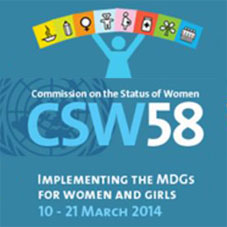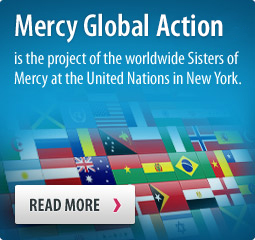
Symptoms or Root Causes? UN 58th Commission on the Status of Women, March 10-21, 2014
Special Reports: March 21, 2014
The overarching theme of the 58th session at the United Nations in New York of the Commission on the Status of Women —“Challenges and achievements in the implementation of the Millennium Development Goals for women and girls”— calls for both courage and risk.
 Courage for those who dare to name the failure of the Millennium Development Goals (MDGs) to name, let alone address, significant structural and root causes of gender inequality and exploitation. Risk for the planners to open themselves to the exposure of that failure and the inadequacy of many Nation States to take responsibility for the targets they themselves set for the MDGs, far too many years ago!
Courage for those who dare to name the failure of the Millennium Development Goals (MDGs) to name, let alone address, significant structural and root causes of gender inequality and exploitation. Risk for the planners to open themselves to the exposure of that failure and the inadequacy of many Nation States to take responsibility for the targets they themselves set for the MDGs, far too many years ago!
And so it is that at the close of the first of two weeks of the Commission on the Status of Women at the United Nations in New York, more than 3,500 participants are registered and are daring to make their voices heard.
In addition to formal sessions scheduled by UN agencies and groups, Non-Governmental Organizations (NGOs) with Economic and Social Council (ECOSOC) status at the UN are convening panels, round tables, presentations and discussion groups to bring unmet issues to the fore. This is an opportunity as well for NGOs to bring women from around the world to the UN—women whose knowledge and expertise, stories and witness can make the case for sustainable development and gender equality as no one else can.
The Sisters of Mercy, Mercy International, are taking advantage of this opportunity to co-sponsor a series of events showcasing women activists from Canada, Colombia, Guyana, Ireland, Peru, South Africa and Uganda. Under the umbrella of the Mining Working Group at the UN, these women are speaking to full audiences on the systemic and root causes of a variety of issues that dig down beneath the surface to the core of issues that the MDGs have ignored.
Gendered Impacts of Extractivism: Modern Forms of Slavery - event co-sponsored by MGA (PDF)
Environmental Justice & Human Trafficking - event co-sponsored by MGA (PDF)
For example, the international, national and local arenas came together in one of these events at a local parish in New York City earlier in the week, where these women engaged in conversation with students, church workers, corporate representatives, parents, women and men religious, political and environmental activists. Sister Áine O’Connor, Coordinator of Mercy Global Action at the UN, set the stage in her introduction to the evening, highlighting the focus issues of the Sisters of Mercy worldwide:
Increasingly and on a global scale, we hear about ecological destruction and injustices: global warming, droughts and floods, typhoons, famine, people protesting against large scale mining projects, or contaminated water and land. The response to this, however, often focuses more on the symptoms of the problems: the water is undrinkable, the crop failed. These symptoms only scratch the surface. Rarely does the narrative explore the systemic causes, the root causes of why the water is polluted, why the crop failed.
Similarly, we hear stories of persons who are among the more than 20 million people who have been victims of human trafficking—coerced sexually or through labor exploitation. Yet it is relatively rare to hear from the media, policy makers, or even in informal conversations about the systemic drivers of human trafficking: poverty, inequality and discrimination—especially of women and girls.
There are deep connections here, and tonight our panelists will help us probe them. Tonight we have an opportunity to gather in faith and across faith traditions to explore the connection between environmental injustices and human trafficking, to pay heed to the root causes of these grave injustices toward our sisters and brothers, and to take steps to make a difference.
Why must we do this? Our faith demands it. The current state of international and national policy making requires it. The future of our planet and the wellbeing of God’s people impel it.
In this parish setting, and in other appearances at events surrounding the UN campus, these women activists are providing powerful testimony on the gendered impact of the extractive model of development (read: mining in all its forms) and contemporary forms of slavery (read: human trafficking). Featured speakers include:
- Simona Broomes (President and founder of the Guyana Women Miners Organization) relating sickening stories of women trafficked in the mining industry and rescues by her organization;
- Samantha Hargreaves (South African Region Coordinator of WoMin) educating and acting for a just transition to a post-extractive future as the only hope for humanity and the planet;
- Betty Obbo (Ugandan Information and Publication Officer of the National Association of Professional Environmentalists) focusing on human rights violations and hazards to the health of female and male miners in shameful circumstances caused by environmental degradation;
- Viviana Tacha-Gutierrez (Colombian human rights lawyer) proposing a clear and constructive human rights approach as essential to both sustainable development and gender equality.
Additional women activists and experts invited by the Mining Working Group include:
- Franciscan Sister Denise Boyle, recently appointed Assistant Director, MIA, Mercy Global Action in Dublin as well as advocating for women and children’s rights and anti-trafficking;
- Dominican Sister María Alejandra Leguizamón, experiencing first-hand the reality of mining degradation and trafficking in her work with youth and as a member of the network of Peruvian religious against human trafficking;
- Sister of Mercy of Newfoundland, Canada, Margie Taylor, journeying with women and men in the criminal justice system, human trafficking, and member of the Mercy International Association Human Trafficking Committee.
Where the Millennium Development Goals have failed, these women have not. Together with and supported by so many Sisters of Mercy worldwide, these partners in justice are delivering the expertise and experience, dedication and daring to move beyond symptoms to root causes. The ultimate goal is to realize a development model that is truly sustainable rather than destructive, and a future based on human rights for women as well as for all of creation.
Messages to:
Rita Parks rsm
Áine O’Connor rsm - MGA Co-ordinator at the UN
Denise Boyle fmdm - Assistant Director MGA




